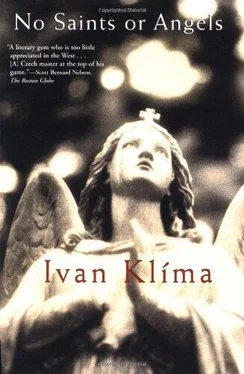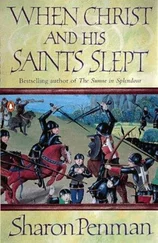If only I stopped damaging my health the way I do. I hate to think what I'll be like in ten years. And this boy who claims to love me now, what will happen to him in ten years' time when my face will be full of wrinkles and I might even be hobbling around with a stick? He'll vanish; he'll go and find someone
younger and I'll be left alone with my child in a world where the drug dealers will be hawking their wares from rucksacks in school corridors. And ultraviolet rain will fall through the hole in the ozone layer.
And what if I'm not around at all ten years from now — my tar-clogged lungs and the rest of me finally consumed by a tumour. I ought to give up smoking, at least. But if I give up I'll start to get even fatter and I'll end up a hideous ball of fat. That's unless I started to do some exercise as my first and only husband always insisted I should. In those days I used to exercise, but I still had the stamina.
In ten years' time Jana is fairly sure to have left home. At least there'd be someone waiting for me when I hobble home from the surgery. At least I'd have someone to look forward to.
'I'm sorry,' my lover said, when he saw I was about to cry. 'I just wanted to convince you that you're not old at all.'
One's as old as one feels, I didn't tell him, but tried to make fun of him instead.
Maybe I do him a disservice. I still tend to compare him with my ex-husband, even though I know he's different. He is gentle and he doesn't believe in reason alone.
I convince myself that he's different. But all men have a selfish streak, and a restless one too, which prevents them from staying with one woman. That's something I oughtn't to forget.
Father Kostka turns up at the surgery. He needs one of his few remaining teeth extracted. I give him an injection and assure him that it won't hurt. The tooth is so wobbly, I expect it wouldn't hurt even without an injection.
'I've no great fear of pain,' he says. As is his wont, he smiles at me with his eyes, and I feel guilty even though my Communist militiaman father is no longer alive.
He sits in the chair waiting for the injection to work. I make up my mind to tell him about the trouble I've been having with my daughter.
'My dear young lady' — this is how he usually addresses Eva and me — 'people expect a priest to put everything down to lack of belief. But belief isn't the only important thing. The apostle Paul spoke about faith, hope and love. And the greatest of the three, he said, was love. It's not easy to believe in the Bible message in this day and age, but young people don't just lack a belief— they lack love. I don't particularly have your daughter in mind, but there are a lot of young people who try to escape from a world in which they don't find any of those three things. I'd also add that we lack the will or the skill to come to terms with things. We are full of pride and are therefore unable to reconcile ourselves with our fate or the people around us, let alone recognize our Father in Heaven above us.'
By now his gums are numb and I prepare the instruments. Meanwhile he adds that children are simply mirrors of ourselves. We look into them and see their faults and shortcomings, but in reality they are our own faults and shortcomings.
It only takes me a few seconds to extract his wobbly tooth.
He spits out the blood, rinses his mouth and thanks me. 'But I expect you wanted to hear something quite different from me, young lady. Something specific.'
I tell him that maybe what he said is what I needed to hear. From him, at least. I could find plenty of would-be scientific advice in any old psychology textbook.
When he is gone, it strikes me that I didn't ask him where one is to find hope and how to care for love so that it lasts, how to support my child without pampering her. But that's something I have to discover for myself.
I go straight from the surgery to see Jana at the drug treatment clinic.
They bring her to me. She is pale and looks puffy, somehow. 'Hi, Mum!'
I look at her and feel searing remorse. It's awful that I feel at fault — more than she does, even. I ask her how she is and she
understandably starts to reproach me for leaving her here in this 'nick'. However she admits that there was some point in it, as the therapy sessions had opened her eyes to a few things. 'Even though sometimes they're totally moronic,' she adds quickly, not wanting to make too many concessions to me.
Then we go for a walk, but it's not easy to converse on the move, so we sit down on a bench. A short distance from us some schizophrenics or alcoholics are weeding a flowerbed. I unwrap an apricot tart I baked her, and my daughter tucks into it with relish. I ask her about the people she's now living with and she says dis-missively that they're all loonies and junkies. She doesn't know what there is to say about them or what she's doing there with them.
'Jana, do you remember what I told you about my grandmother?' I ask her.
'Which one?'
'My mother's mother. The one I didn't even know.'
'Oh, yeah. She died in some concentration camp.'
'They killed her with poison gas.'
'Yeah, so you told me.'
'When I told you about it, you said how awful it must have been. And now here you are slowly poisoning yourself
She gives me a pitying look, as if to let me know how little I know about real life. 'But that's something totally different.'
I try to explain to her that the only possible difference is that in those days someone held the lives of other people in contempt, while in her case, she held her own life in contempt.
She shakes her head angrily; this doesn't fit in with the performance she had been preparing for me. She starts trying to persuade me that what I said might be true if she'd ever committed anything like that, but she had never taken any poisons, and I wasn't to leave her there any more, that the conditions were dreadful and they wouldn't cure her anyway, as there was nothing to cure.
'Oh, but there is, Jana. Don't forget I know what they found in your blood.'
'That was a total one-off.'
'You can try that one on someone who knows nothing about it, but it won't wash with me.'
'It was a one-off and I'll never try it again. I've realized it was stupid.'
'Am I supposed to believe you?'
She promises me she'll never do anything of the sort again. She even swears it.
I say nothing. I don't want to make light of her pledge, but I know how little store I can set by her determination.
'Mummy, you can't leave me here! I'll go out of my mind.'
'You're more likely to go out of your mind from what you've pumped into yourself. You'll stay here until you're cured. And that takes more than two or three weeks, I'm afraid.'
'Do you really mean it?'
I nod. She picks up the rest of the tart and hurls it to the ground. Then she stands up and runs off.
I have an urge to run after her, but I know I mustn't.
In the evening my sister Lida calls me long-distance to ask for news of Jana. 'Mum told me you'd put her in the loony bin.'
I reply that she is naturally not locked up with mental patients.
My sister didn't think she was, but even so I hadn't chosen the best place for her.
'It's not the best place for anyone', I say.
'We won't argue about that,' she says. 'But I heard they don't get very good results. You can't risk your daughter falling back into her old ways when she comes out.' Then she proceeds to tell me about the guitarist in her band who underwent treatment in a community near Blatná. They managed to cure him. She knows the therapist who runs the community. He's a great guy, she says, and she could persuade him to take Jana.
I'm not sure. I'm not used to my sister helping me, and certainly not of her own accord. 'But I don't know anything about the place.'
Читать дальше












